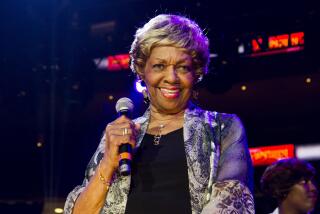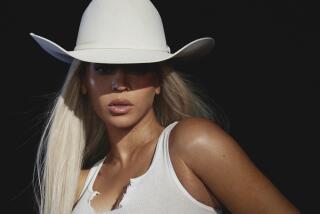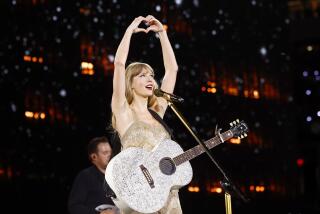POP MUSIC REVIEW : HOUSTON STICKS WITH HER PROVEN FORMULA
Whitney Houston’s current concert tour is dubbed “Moment of Truth”--a tantalizing suggestion that the 23-year-old superstar might be ready to engage in some of the artistic risk-taking that was largely missing from her commercial blockbuster debut album.
That was just one of several reasons for heightened expectations going in to Houston’s show Saturday at Irvine Meadows Amphitheatre.
In addition, the initial single from her latest album was the spunky “I Wanna Dance With Somebody (Who Loves Me),” and the video for that song boasted far more personality and kick-up-your-heels fun than the young Grammy-winning singer demonstrated in her first local performances a year ago.
And because she’s no longer the rookie who would be granted every benefit of the doubt about her technically impressive but emotionally shallow vocals, it appeared that Houston herself recognized the need to really strut her musical stuff.
So much for expectations.
In her 90-minute Irvine Meadows show, Houston showed why she’s so well-suited to do those Coca-Cola commercials. After the soft-drink maker found out the hard way that it shouldn’t have scrapped its classic formula, Houston demonstrated that she’s not about to tamper with a prescription for hits that has produced two No. 1 albums, five consecutive No. 1 singles and packed concert halls.
From the 11-member band’s Vegas-like overture of hits that preceded Houston’s arrival to the final drawn-out notes of an encore rendition of “Greatest Love of All” that was even more melodramatic than on record, Houston’s performance was long on vocal and production histrionics but short on the emotions it could only mimic. (Her technical crew deserves plaudits for a stunningly staged and lighted show, fog machines notwithstanding.)
Over the course of an evening, Houston’s formula becomes all too clear: one bouncy dance tune, then a ballad that begins quietly before building to Herculean proportions, another dance tune, another ballad. . . . Because her new “Whitney” album is a virtual replay of its predecessor, that sameness is even more glaring.
Almost without exception, her songs appear to be selected as vocal showcases rather than for perceptive lyrics or creative melodic opportunities. Michael Masser and Will Jennings’ “Didn’t We Almost Have It All,” the latest Houston single to top the charts, exemplifies the problem with much of her material. The song is as cagily crafted to trigger programmed responses from audiences as a TV sitcom is to elicit laughter--even when the subject matter doesn’t warrant such reactions: “Didn’t we almost have it all / When love was all we had worth giving / The ride with you was worth the fall . . . / Loving you makes life worth living.”
Houston treated each line to successively intensified phrasing, with occasionally breathtaking swoops and dives. But even her dramatics couldn’t compensate for basic compositional weaknesses. Is the song about lost love? Dying love? Rekindled love? And “didn’t we almost have what all”? You won’t find the answer in this song’s hodgepodge of conflicting tenses and sentiments.
Quasi-incomprehensibility isn’t the only problem in Houston’s song bag. Preston Glass’ “Love Is a Contact Sport,” which should be playfully sexy a la the Pointer Sisters, is simply hackneyed: “Love is a contact sport / You gotta move in tight / If you wanna do it right.” Yikes!
The show soared most not from her singing--except during a gospel number that drew from the foundation in spiritual music she inherited from her mother, gospel singer Cissy Houston--but during instrumental breaks that permitted percussionist Kevin Jones to blaze on congas and timbales and saxophonist Josh Harris to pour out a couple of scorching tenor solos.
Houston is living proof of the self-motivating advice taped up on countless refrigerators around the country--”One can’t be too thin, too rich or too beautiful.” One can, however, be too careful, a message that Houston should take to heart if she wants her artistry to match her talent.
South African jazz guitarist-cum-R&B; singer Jonathan Butler presented himself as a slightly funkier version of George Benson or Earl Klugh in his 40-minute opening set. In two instrumentals, Butler merely hinted at his technical prowess with Benson-like parallel octave leads and a couple of brief flourishes. The remainder of his set was devoted to innocuous medium-groove love songs.
The same bill will play the Forum on Friday.
More to Read
The biggest entertainment stories
Get our big stories about Hollywood, film, television, music, arts, culture and more right in your inbox as soon as they publish.
You may occasionally receive promotional content from the Los Angeles Times.










